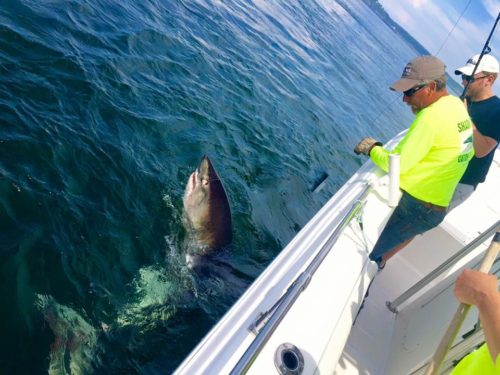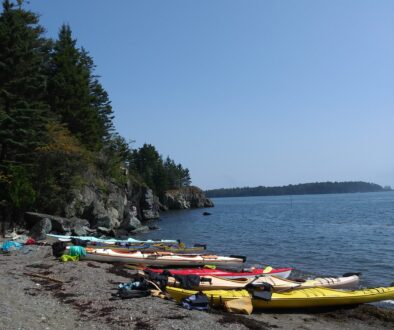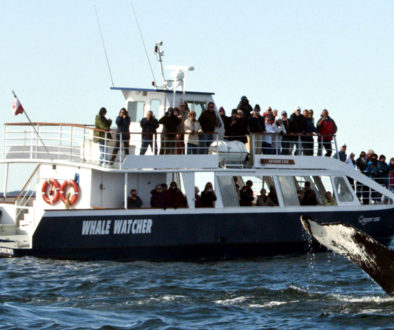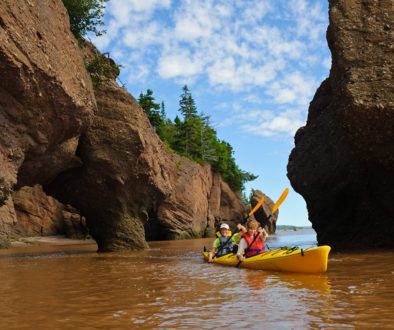St. Andrews Sport Fishing Co. & Island Quest Marine- Whale and Wildlife Cruises
Shark Tagging and Conservation in the Bay of Fundy
The early morning fog lifts as the sun begins to break through, revealing the coastline of Passamaquoddy Bay. Nicole Leavitt Kennedy has spent most of her life on these waters, her family has made a living off the ocean for as long as she can remember. Her father, Chris, was a 7th generation fisherman who became interested in boat building. In 1999 he and his wife, Carolyn, started a new adventure opening Island Quest Marine- Whale & Wildlife Cruises based in St. Andrews, New Brunswick.
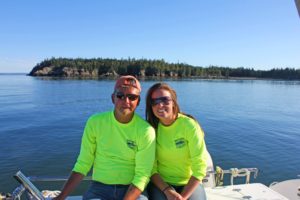 Those summers spent on her family’s whale watching boat helped ignite Nicole’s love of the ocean- she went on to complete both a bachelors and masters at the University of New Brunswick. As the head biologist her summers are spent coordinating summer students, cataloguing whales, running social media, and as liaison for their shark tagging research.
Those summers spent on her family’s whale watching boat helped ignite Nicole’s love of the ocean- she went on to complete both a bachelors and masters at the University of New Brunswick. As the head biologist her summers are spent coordinating summer students, cataloguing whales, running social media, and as liaison for their shark tagging research.
After running their whale watching business for 10 years Nicole’s father, Chris, decided to expand their business- returning to his fishing roots with St. Andrews Sport Fishing Co. While fishing for things like cod and mackerel, Chris began encountering sharks. He came to Nicole, wanting to know more about the sharks he was encountering. These questions led to a partnership with Dr. Steve Turnbull at the University of New Brunswick in Saint John and the Canadian Shark Conservation Society. This began their involvement with shark tagging research.
Porbeagles are the focus of their tagging research because very little is known about them, especially in the Bay of Fundy. The work examines where and how they are using the bay, why they’re here and where they are going after they leave. To date, approximately 100 sharks have been caught and tagged, six of which have the more expensive satellite tags. Almost all of the sharks that have been caught and tagged have been females and are significantly larger than the few males that have been tagged. After leaving the Bay of Fundy, the sharks with satellite tags have been tracked to Newfoundland and Massachusetts!
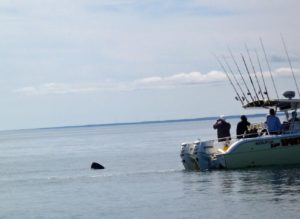 Over the 9 seasons of shark tagging, Nicole has seen a spike in interest from the public with more sightings being reported as well. “The passion people have for the conservation aspect of shark tagging is amazing to see. It’s great because we do get guys that want to come out and maybe not necessarily for the conservation side. But once you sit down and talk to them about how important sharks are for the ecosystem, and how their populations have just been decimated around the world I think they really start to understand that you don’t need to necessarily kill everything that you catch.”
Over the 9 seasons of shark tagging, Nicole has seen a spike in interest from the public with more sightings being reported as well. “The passion people have for the conservation aspect of shark tagging is amazing to see. It’s great because we do get guys that want to come out and maybe not necessarily for the conservation side. But once you sit down and talk to them about how important sharks are for the ecosystem, and how their populations have just been decimated around the world I think they really start to understand that you don’t need to necessarily kill everything that you catch.”
She believes the importance of their work expands beyond the information they are learning about sharks. It also teaches the public about the importance of conservation through the experience and education they provide to their guests. “So, I think that’s important, letting the public experience something as amazing as being able to tag a shark is really probably the best part of it for us. Once they have that connection and get to do it, then they have the passion for conservation. We are basically ground zero for inspiring the love of the environment.”
Nicole says it’s difficult to pick out a specific favourite memory from their years conducting the research. “You have people that cry, you have people that scream for minutes on end especially once you get the tag on the shark. You do a good release and watch the shark, they are robust, especially porbeagles, they are football shape, large girls. You release, and the guys whoop and holler and you know it’s such a rush to know that you just put a tag on the shark and watch them swim away successfully. Every time is memorable it’s just the feeling and experience.”
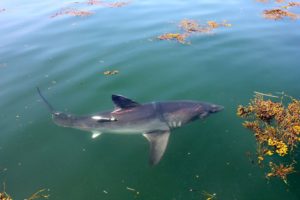 When asked about the role of sharks and why people should care about protecting them Nicole had this to say: “Shark populations around the world are decreasing dramatically, because of things like overfishing, shark finning, and even climate change. So, they are incredibly vulnerable at this point in time. Sharks are such an important species in an ecosystem- they keep fish populations healthy, they transfer carbon, as an apex predator they keep the ecosystem in check. They are incredibly important for keeping our ocean ecosystems all around the world healthy.”
When asked about the role of sharks and why people should care about protecting them Nicole had this to say: “Shark populations around the world are decreasing dramatically, because of things like overfishing, shark finning, and even climate change. So, they are incredibly vulnerable at this point in time. Sharks are such an important species in an ecosystem- they keep fish populations healthy, they transfer carbon, as an apex predator they keep the ecosystem in check. They are incredibly important for keeping our ocean ecosystems all around the world healthy.”
Nicole believes that the health of the oceans in Atlantic Canada need to be looked at more as a whole, as opposed to little pockets or industries and that protections for sharks in Canada could be greatly improved. She also thinks that the ocean ecotourism industry is one of the most crucial for educating the public about ocean health and conservation issues. Every summer this industry reaches thousands of people, inspiring love for the animals and love for the area. And when people feel attached or connected to an area, they are more likely to protect it. We agree Nicole, thank you for being a New Brunswick Ocean Champion!
At the time of release both Island Quest Marine- Whale and Wildlife Cruises and St. Andrews Sports Fishing are planning to start operations for the 2020 season on July 1st. Be sure to visit and like their Facebook pages https://www.facebook.com/QuestWhale and https://www.facebook.com/StAndrewsFishing to stay up to date on their plans for 2020!

